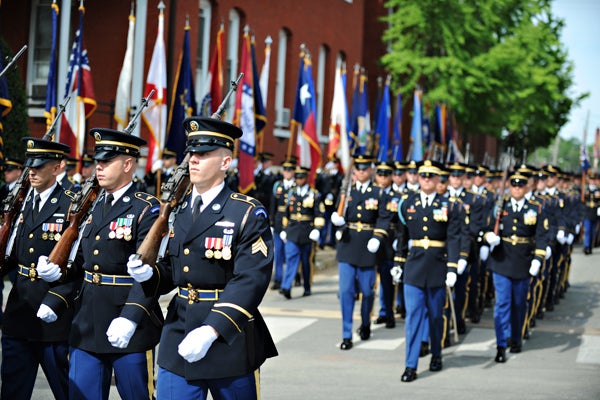|
August 8, 2011
Stanford scholars examine gap between America's civil, military societies
How can it be that the Army is at war and the country is not? In the latest issue of Dædalus, the journal of the American Academy of Arts and Sciences, several Stanford faculty examine the causes and consequences of this question and weigh in on the changing relationship between military and civil society. By Stephanie Liou

Professor emeritus William Perry notes that less than 1 percent of Americans have a family member serving in active duty, and barely one in five members of Congress have ever served in the military. (Photo: U.S. Army Staff Sgt. Teddy Wade) "It worries me a lot that we can wage war without breaking a sweat," said Stanford historian David Kennedy. "It is a dangerous situation when civil society and its military grow distant from another."
Kennedy, who won the Pulitzer Prize for his book Freedom From Fear in 2000, is the guest editor of the Summer 2011 edition of Dædalus, the journal of the American Academy of Arts and Sciences.
The volume, titled The Modern American Military, includes work by more than a dozen leading scholars. It features an introduction by Kennedy; a foreword by former Secretary of Defense William Perry, professor emeritus of management science and engineering and a senior fellow emeritus at the Freeman Spogli Institute for International Studies; and an essay by James Sheehan, professor emeritus of history.
A growing chasm
"Today's American military is at once increasingly prominent as an instrument of national policy and increasingly detached from and poorly understood by the civilian society in whose name it is asked to fight," writes Kennedy, who hopes that this collection of essays can inspire serious conversations about a growing problem.
In his foreword, Perry, the Michael and Barbara Berberian Professor, Emeritus, highlights how less than 1 percent of Americans have a family member serving in active duty, and barely one in five members of Congress have ever served in the military. These statistics, he argues, suggest that the American people and their elected representatives are less engaged with the U.S. military than at any time this past century.
According to Kennedy, this trend could prove destructive.
"Disaffected veterans brought Mussolini and Hitler to power, born and bred in the soil of increasing misunderstanding between civil and military sectors," he said. "It is a venerable American tradition that the citizens not only staff the military but they control it."
But what can be done to bridge this separation, when our military now consists of a small, all-volunteer force including some 70,000 non-citizens?
Conscription?
One potential approach that has been mentioned in the media over the past few years is reinstating the draft. In his essay, "The Future of Conscription: Some Comparative Reflections," Sheehan, the Dickason Professor in the Humanities, Emeritus, takes a detailed look at the fate of conscription in other nations and its relationship with the definition of citizenship.
"The theory and practice of conscription were inseparable from the larger ideals and major institutions of the modern state," he writes. The fact that conscription no longer exists in Europe and the United States is testament to significant changes in the nature of citizenship.
"Citizenship now has much more to do with rights and entitlements than with duties," said Sheehan. "This is not necessarily a bad thing, but the weakening of ties of loyalty is something we ought to worry about."
Due to recent developments in technology and the changing face of warfare over the past century, however, mandating military service might do more harm than good and is also impractical, Sheehan says.
"I don't think the traditional draft meets the kind of demand that a modern military would require," he said. "The weapons that they have to use are much more complicated, and I don't think you can train people that quickly."
He also points out that the opportunity cost of taking so many people out of the economy would simply be too high.
Instead, Sheehan says he believes that it is possible to increase civilian engagement and strengthen the bonds of citizenship through other forms of mandatory service.
"I would be in favor of thinking about some form of national service that wouldn't be military," he said. "People would be expected to make a social contribution, such as the Peace Corps or Teach for America."
Kennedy, the Donald J. McLachlan Professor of History, Emeritus, proposes a lottery system. Essentially, every citizen of a certain age would be eligible to be called upon for service, but only a certain percentage would actually be chosen. This would expose everyone to the possibility of service, with the intention of making the military seem more relevant and personal.
"The more civilian engagement, the more prudence in decisions for usage of the force," said Kennedy.
Stanford's role
Although fiery protests rocked the campus and the nation during the Vietnam era and helped contribute to the initial formation of the all-volunteer force, both Kennedy and Sheehan support recent decisions by Stanford and other leading universities to officially reinstate campus ROTC programs. They believe that this will be crucial to Stanford's ability to educate the next generation of leaders.
"Stanford students need to understand that this [the military] is an honorable career path," said Kennedy.
"It is a bad thing if people of prominence and privilege have no knowledge of, interest in or commitment to the military," agreed Sheehan. "The American military … is something that we should be proud of. It shouldn't be seen as something being done by someone else."
The scholars also hope that Stanford can offer more courses in military history and military culture, in order to foster more study and understanding of these complex issues.
Stephanie Liou is an intern at the Stanford News Service.
-30-
|